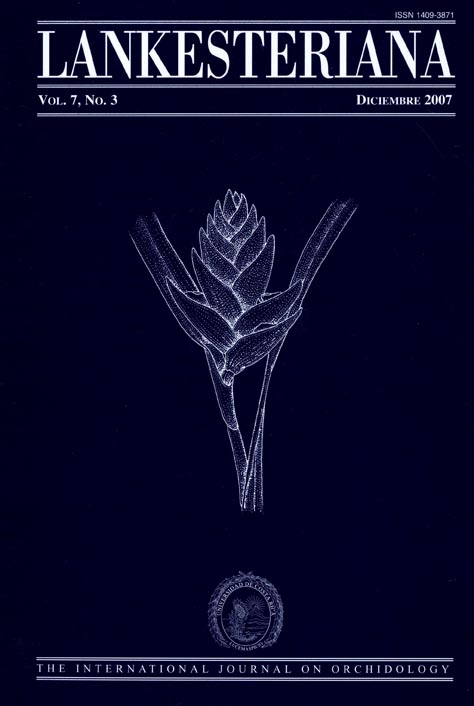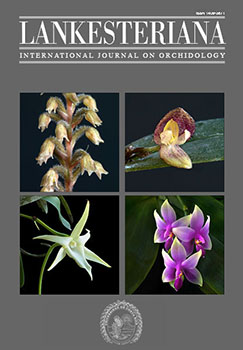Observations on the effect of nectar-robbery on the reproductive succes of Aeranthes arachnitis (Orchidaceae)
DOI:
https://doi.org/10.15517/lank.v0i0.7934Palabras clave:
Orchidaceae, Aeranthes arachnitis, hormigas, Teoría de Bell, robo de néctar, éxito reproductivo, ants, Bell's Theory, nectar- robbery, reproductive successResumen
While the presence of nectar is the most common floral reward offered by orchids, approximately one-third of orchid species have evolved mechanisms of deceit whereby the pollinator receives no reward. Lack of reward has been shown to have a significant negative effect on reproductive success in the Orchidaceae, however the phenomenon of nectar-robbery has been poorly studied. Here we investigate the effect of nectar-robbery induced deceit by invasive ants in the nectariferous orchid Aeranthes arachnitis. Fruiting success was found to be below 5% at three sites, including two conservation areas, compared with 48.5% at a site next to plantations. All the populations showed loss of floral nectar, ranging from 64.3% to 100% of flowers observed. Loss of nectar to robbers that do not facilitate pollination not only represents a cost to fruiting success but also a loss of a resource to the orchid through reabsorption of any excess. Using Bell's Theory of nectar concealment it is possible to determine the critical point, below which nectar-robbery negatively affects fruiting success. Based on related angraecoid orchids the proportion of nectar bearing flowers would, theoretically, need to be 70%. The higher levels of reproductive success surrounded by plantations may due to the presence of the non-native Callistemon citrinus acting as nectar source, thus maintaining an increased local abundance of the pollinator. This has important implications for the conservation and management of Aeranthes arachnitis and other species, which rely on nectariferous pollinators, particularly when a nectar bearing species becomes essentially deceptive. The result suggests that management of this nectar-robbery induced deceptive species should involve the manipulation of rewarding species within the surrounding area.Descargas
Los datos de descargas todavía no están disponibles.
Descargas
Publicado
2007-11-01
Cómo citar
L. Roberts, D. (2007). Observations on the effect of nectar-robbery on the reproductive succes of Aeranthes arachnitis (Orchidaceae). Lankesteriana: International Journal on Orchidology, 7(3). https://doi.org/10.15517/lank.v0i0.7934
Número
Sección
Artículos
Licencia
Conforme con las Políticas de Acceso Abierto promovidas por la Universidad de Costa Rica, los derechos de autor de todos los artículos publicados en Lankesteriana se encuentran bajo una licencia Creative Commons y pueden ser descargados gratuitamente. Los derechos de autor y de publicación pertenecen a la revista bajo la licencia CC BY-NC-ND 3.0 CR.
Before the publication of the materials submitted by the author(s) in LANKESTERIANA, the author(s) hereby assign all rights in the article to the Lankester Botanical Garden.





